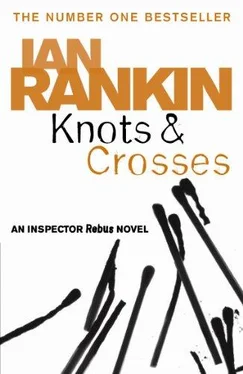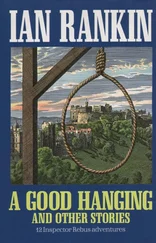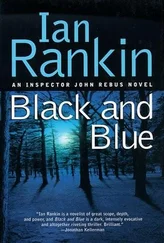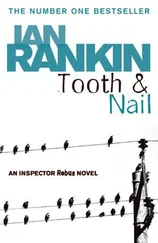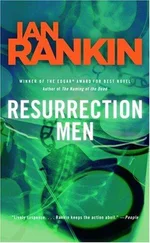‘But it might be difficult,’ she continued, ‘the case going the way it is. Let’s just promise to keep in touch, okay?’
‘Okay.’
He hoped that she took note of the dismay in his voice, the disappointment of the small boy at having his request denied.
They pecked a final kiss, mouths brittle by now, and then she was gone. Her scent remained, however, and he breathed it in deeply as he prepared for the day ahead. He found a shirt and a pair of trousers that didn’t reek of tobacco, and these he put on slowly, admiring himself in the bathroom mirror, the soles of his feet damp, while he hummed a hymn.
Sometimes it was good to be alive. Sometimes.
Jim Stevens poured another three aspirin into his mouth and drank his orange juice. The ignominy of it, being seen in a Leith bar sucking on fruit juice, yet the idea of drinking even a half-pint of the rich, frothing beer made him feel nauseous. He had drunk far too much at that party; too much too quickly, and in too many combinations.
Leith was trying to improve itself. Someone somewhere had decided to give it a bit of a dust and a wash. It boasted French-style cafes and wine bars, studio flats, delicatessen. But it was still Leith, still the old port, an echo of its roaring, bustling past when Bordeaux wines would be unloaded by the gallon and sold on the streets from a horse and cart. If Leith retained nothing else, it would retain a port’s mentality, and a port’s traditional drinking dens.
‘By Christ,’ roared a voice behind him, ‘the man drinks everything in doubles, even his soft drinks!’
A heavy fist, twice the dimensions of his own, landed on Stevens’ back. The swarthy figure landed on a stool beside him. The hand stayed firmly where it was.
‘Hello, Podeen,’ said Stevens. He was starting to sweat in the heavy atmosphere of the saloon, and his heart was pounding: terminal hangover symptoms; he could smell the alcohol squeezing itself out of his pores.
‘Lordy, James me boy, what the hell’s that you’re supping?
Barman, get this man a whisky quick. He’s wasting away on kiddies’ juice!’
With a roar, Podeen took his hand off the reporter’s back just long enough to relieve the pressure, before bringing it back down again in a stinging back-slap. Stevens felt his insides shudder rebelliously.
‘Anything I can do for you today?’ said Podeen, his voice much lower.
Big Podeen had been a sailor for twenty years, with the scars and nicks of a thousand ports on his body. How he made his money these days, Stevens did not wish to know. He did some bouncing for pubs on Lothian Road and dubious drinking-dens around Leith, but that would be the tip of his earnings iceberg. Podeen’s fingers were so encrusted with dirt that he might have carved out the black economy singlehandedly from the rotten, fertile soil beneath him.
‘Not really, Big Man. No, I’m just mulling things over.’
‘Get me a breakfast, will you? Double helpings of everything.’
The barman, almost saluting, went off to give the order.
‘See,’ said Podeen, ‘you’re not the only man who orders everything in doubles, eh, Jimmy?’
The hand was lifted from Stevens’ back again. He grimaced, waiting for the slap, but the arm flopped onto the bar beside him instead. He sighed, audibly.
‘Rough night last night was it, Jimmy?’
‘I wish I could remember.’
He had fallen asleep in one of the bedrooms, very late in the evening. Then a couple had come in, and they had lifted him into the bathroom, depositing him in the bath. There he had slept for two hours, maybe three. He had awakened with a terrific stiffness in his neck, back, and legs. He had drunk some coffee, but not enough, never enough.
And had walked in the chilled morning air, chatting in a newsagent’s shop with some taxi-drivers, sitting in the porter’s cubby-hole of one of the big hotels on Princes Street, supping sweet tea and talking football with the bleary nightporter. But he had known he would end up down here, for this was his morning off, and he was back on the drugs case, his own little baby.
‘Is there much stuff around at the moment, Big?’
‘Oh, now, that depends what you’re looking for, Jimmy. Word’s out that you’re getting to be a bit too nosy in every department. Best if you were sticking to the safe drugs. Keep away from the big stuff.’
‘Is this a timely warning or a threat or what?’ Stevens wasn’t in the mood to be threatened, not when he had a Sunday morning hangover to sort out.
‘It’s a friendly warning, a warning from a friend.’
‘Who’s the friend, Big?’
‘Me, you silly sod. Don’t be so suspicious all the time. Listen, there’s a little cannabis around, but that’s about it. Nobody brings the stuff into Leith any more. They land it on the Fife coast, or up by Dundee. Places the Customs men have all but disappeared from. And that’s the truth.’
‘I know, Big, I know. But there is a delivery going on around here. I’ve seen it. I don’t know what it is. Whether it’s big stuff or not. But I’ve seen a handover. Very recently.’
‘How recent?’
‘Yesterday.’
‘Where?’
‘Calton Hill.’
Big Podeen shook his head.
‘Then it’s nothing at all to do with anyone or anything I know, Jimmy.’
Stevens knew the Big Man, knew him well. He gave out good information, but it was only what was given to him by people who wanted Stevens to get to know about something.
So the heroin boys would come across, via Big, with information about cannabis dealing. If Stevens took the story up, chances were the cannabis dealers would be caught. And that left the territory and the demand to the heroin boys. It was clever stuff, ploy and counter-ploy. The stakes were high, too. But Stevens was a clever player himself. He knew that there was a tacit understanding that he was never to aim for the really big players, for that would mean aiming for the city’s businessmen and bureaucrats, the titled landowners, the New Town’s Mercedes owners.
And that would never be allowed. So he was fed tidbits, enough to keep the presses rolling, the tongues wagging about what a terrible place Edinburgh was becoming. Always a little, never the lot. Stevens understood all that. He had been playing the game so long he hardly knew sometimes what side he was on. In the end, it hardly mattered.
‘You don’t know about it?’
‘Nothing, Jimmy. But I’ll nose around. See what’s doing. Listen, though, there’s a new bar opened up by the Mackay showroom. Know the one I mean?’
Stevens nodded.
‘Well,’ went on Podeen, ‘it’s a bar at the front, but it’s a brothel at the back. There’s a wee cracker of a barmaid does her stuff of an afternoon, if you’re interested.’
Stevens smiled. So a new boy was trying to move in, and the old boys, Podeen’s ultimate employers, didn’t like it. And so he, Jim Stevens, was being given enough information to close down the new boy if he liked. There was a nice headline-catcher in it certainly, but it was a one-day wonder.
Why didn’t they just telephone the police anonymously? He thought he knew the answer to that one, though once it had puzzled him: they were playing the game by its old-fashioned rules, which meant no snitching, no grassing to the enemy. He was left to play the part of messenger-boy, but a messenger-boy with power built into the system. Just a little power, but more power than lay in doing things along the straight and narrow.
‘Thanks, Big. I’ll bear that in mind.’
The food arrived then, great piles of curled, shining bacon, two soft, near-transparent eggs, mushrooms, fried bread, beans. Stevens kept his eyes to the bar, suddenly interested in one of the beer-mats, damp still from Saturday night.
Читать дальше
